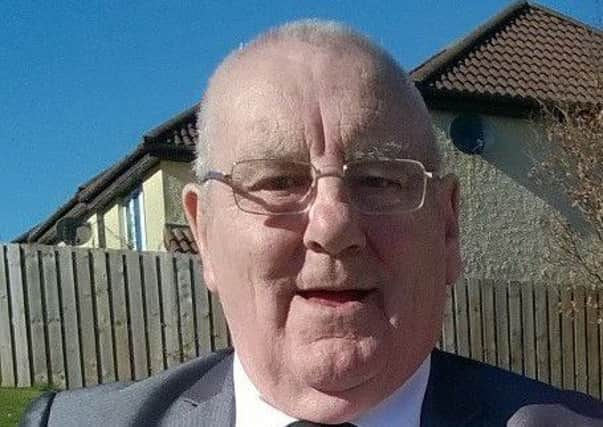Obituary: Frank Docherty, campaigner for survivors of abuse


Gallus, funny, determined and unwavering – Frank Docherty was a huge personality and, for the last 20 years, a man on a mission to achieve justice for Scotland’s forgotten survivors of abuse.
His own battle to overcome the effects of hideous treatment at the hands of nuns has lasted from childhood but over the last two decades he channelled his energy into a campaign seeking redress and accountability for the countless youngsters who, like him, had their formative years scarred by abuse while in care.
Advertisement
Hide AdAdvertisement
Hide AdHe was a hero and a lifeline to many who never had the courage to speak out until he stood up on their behalf, fighting successive governments to see a public inquiry set up to scrutinise such abuse, acknowledge the suffering and help safeguard the future for other vulnerable children.
But it was not until after the Scottish Child Abuse Inquiry was established in 2015, more than 60 years after he and his siblings were abandoned by his alcoholic parents to the care of the Catholic church, that he was finally able to give his own testimony, one of the first two people to do so.
More recently, he had been eagerly anticipating the opportunity to provide more evidence, this time about the founding of INCAS, the In Care Abuse Survivors group he established. He was scheduled to appear as a witness on July 4.
Francis Crum Docherty was born in Oakbank Hospital in Glasgow’s Possil Road and had a brother and sister named after his parents, Joseph and Norah. Young Frank was only nine when they were dumped with the church and condemned to a miserable life of beatings, humiliation and cruelty. He got his first taste of the brutal regime at Lanark’s Smyllum Orphanage when one of the nuns, who ran the institution, repeatedly kicked him and beat him with a hairbrush on day one. His “crime” had been only to weep childish tears.
He survived two years at Smyllum where, before the ritual of requiem mass at nearby St Mary’s Church, children were forced to kiss the cold head of any nun who had died. Pitifully, any children who lost their lives at the orphanage, from illnesses like pneumonia, were buried in unmarked paupers’ graves in the same churchyard. Docherty would later be so moved by the indifference to the tiny mounds, thought to signify the last resting place of 100 bodies, that he would spend years trying to identify them.
After his time at Smyllum Docherty, who suffered a fairly fractured education and had little stability in his early life, eventually left Scotland for London. Following in the footsteps of his brother, he worked in Soho for a period. Then on returning to Scotland, he took various jobs: he drove buses and heavy trucks, did painting and decorating and at one time had a stall at the Barras in Glasgow selling Bay City Rollers-style clothing. He also got into house clearances, buying and selling second-hand furniture.
But the trauma of his childhood remained in his psyche and he began trying to help others who had suffered similarly by setting up a group, AVA, for abuse victims.
However, it became clear there were many seeking assistance for various types of abuse that he was unable to help. Instead, something was required specifically for those who had been abused while in care.
Advertisement
Hide AdAdvertisement
Hide AdAt the time, more reports of allegations of cruel treatment and assaults in other Catholic-run children’s homes were surfacing and, following a meeting in Glasgow’s Maryhill for alleged victims, a number of people came forward to help. INCAS was founded and Docherty served as its honorary president and treasurer.
Many who needed their help were troubled but Docherty, who had successfully overcome problems with alcohol, knew exactly what they were going through and manned the helpline with equal doses of compassion and humour.
“Frank’s legacy in relation to survivors will be the amount of healing he began for individuals,” said Helen Holland, chair of INCAS. “He gave his own time willingly and could have a survivor on the phone for two hours. He always said to them ‘You are believed and you are not alone’ and he reassured people, almost through his sense of humour.
“He liked a joke and always used to end the conversation with a joke. Someone would come on the phone really upset, traumatised and anxious and by the time they had finished talking they would be having a laugh. That made it easier for them to call back and build up the relationship with INCAS. They realised they were with people who understood and they didn’t need to go into detail.”
Although he was very much a hands-on volunteer – he travelled to Aberdeen to support those giving evidence at the trial of a notorious nun convicted of cruel and unnatural treatment – he was also heavily involved in campaigning, in particular for those, like himself, who fall into the category of pre-1964 abuse survivors who have no legal right to claim compensation for their ordeal.
His widow, Janet, has vowed to continue his fight and plans to scatter his ashes at the INCAS memorial site in St Mary’s Cemetery in Lanark, where so many of those nameless little children who failed to survive are buried.
He is survived by his wife, children, brother and sister and large extended family.
The INCAS Helpline can be contacted on 079999 06442
ALISON SHAW